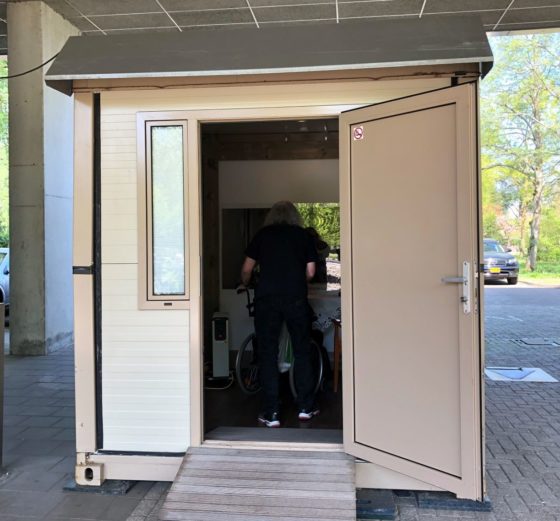Company turns cabins into ‘meet the elderly’ spaces for care homes


Thea Vroomen sits in her wheelchair, her arms resting on a lacy tablecloth, looking benignly across the table at her daughter.
This wouldn’t normally be unusual: Karin Berenschot-Vroomen has visited her 78-year-old mother three times a week since she went into a nursing home with Alzheimer’s in 2017.
But now that Vitalis ‘t Lint in Eindhoven has gone into lockdown and banned visitors, like all the Netherlands’ 2,500 homes, this is a very unusual visit: they are in a small, specially cleaned cabin, with a Perspex screen between them, and two separate doors.
‘The cabins are normally used for festivals,’ says Flexotels marketing and sales manager Jeroen van Vliet. ‘But the events sector has been hard hit and our income had fallen to zero. We had to think of something quickly and act to save our business.’
FlexVisit
The idea they came up with was the FlexVisit cabin: two sides have two separate doors, separated by the screen. In complete hygiene and privacy, people who need to stay apart because of coronavirus regulations can sit just centimetres away from each other.
For Karin and her husband Jan – who sits vaping next to her – it’s a valuable chance to catch up with her mum. ‘I think it’s very important for her to see us,’ she says. ‘If I didn’t see her for two or three months, I do think her health would decline.’
As it stands, though, Mrs Vroomen says everything is good – although her care worker has to explain why they are in a cabin in the garden and can’t simply meet outside.
André de Loof, activities worker, is impressed with the cabin concept. ‘It’s a good step to have alongside everything else,’ he says. ‘We were Skyping and calling but this is really something special.’
Emotional
The home has just extended the cabin’s week-long hire to a month due to the demand – from people wanting to drop in and stay in touch to fragile residents saying goodbye to loved ones for the last time.
‘In the cabin, there are very emotional moments, and people really blossom,’ says Ingrid van den Berg, location manager at Vitalis ‘t Lint. ‘This is an emergency solution that means we are still able to protect vulnerable older people.’
For Flexotels, based in Best, it’s also a signal that its converted two-bed cabins could be used for all kinds of purposes during the coronavirus lockdown, bringing the business a much-needed €3,000 per cabin per month. ‘We are getting requests from all kinds of companies that need personal contact,’ says Van Vliet. ‘I anticipate that we will hire out every single unit in the next week.’
Angst
Particularly for people in care homes – 70% of whom have dementia and may struggle with devices – the concept is life-changing.
Gerjoke Wilmink, executive director of Alzheimer Nederland, said: ‘For a lot of people with dementia, the telephone doesn’t work because they recognise who people are through physical contact.
‘Angst and panic can also have a negative effect, and it is very difficult to explain the coronavirus again each time. This is a very sad situation, but for people who can have one, a visitors’ cabin is terrific.’
Thank you for donating to DutchNews.nl.
We could not provide the Dutch News service, and keep it free of charge, without the generous support of our readers. Your donations allow us to report on issues you tell us matter, and provide you with a summary of the most important Dutch news each day.
Make a donation